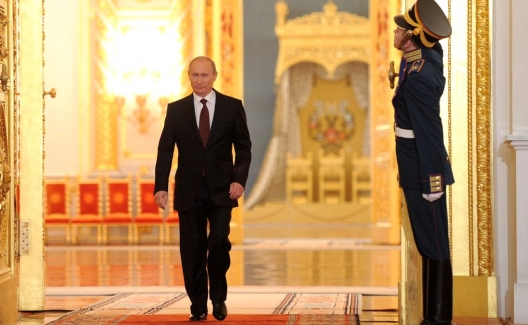 Some of Vladimir Putin’s closest allies, including the chairman of OAO Gazprom, a deputy premier and two former ministers, helped one of Russia’s largest criminal groups operate out of Spain for more than a decade, prosecutors in Madrid say.
Some of Vladimir Putin’s closest allies, including the chairman of OAO Gazprom, a deputy premier and two former ministers, helped one of Russia’s largest criminal groups operate out of Spain for more than a decade, prosecutors in Madrid say.
Members of St. Petersburg’s Tambov crime syndicate moved into Spain in 1996, when Putin was deputy mayor of the former czarist capital, to launder proceeds from their illicit activities, Juan Carrau and Jose Grinda wrote in a petition to the Central Court on May 29, a copy of which was obtained by Bloomberg News.
The 488-page complaint, the product of a decade of investigations into the spread of Russian organized crime during the Putin era, portrays links between the criminal enterprise and top law-enforcement officials and policy makers in Moscow. The petition, based on thousands of wiretaps, bank transfers and property transactions, is a formal request to charge 27 people with money laundering, fraud and other crimes. Approval by a judge would clear the way for a trial, but Spain doesn’t try people in absentia.
The only Russian official facing possible charges is Vladislav Reznik, a member of Putin’s ruling United Russia party and the deputy head of the finance committee in the lower house of parliament. The complaint, earlier reported by Spain’s El Mundo and ABC newspapers, says Reznik helped the alleged leader of the enterprise, Gennady Petrov, get his associates appointed to key posts in Russia in exchange for assets in Spain. Prosecutors are seeking to confiscate a property they say Reznik owns on the resort island of Majorca.
“The criminal organization headed by Petrov managed to achieve a clear penetration of the state structures in his country, not only with the lawmaker Reznik but with several ministers,” the prosecutors say in the petition.
Putin himself is mentioned by name three times in the document, including in a partial transcript of a call between two alleged Tambov operatives in 2007. The men are discussing an issue with a hotel in the Alicante region and one refers to a house that he says Putin owns in nearby Torrevieja….
While accusations of graft are not uncommon in Russia, which is tied with Nigeria in Transparency International’s corruption perception ranking, few investigations have identified so many senior officials by name. The highest-ranking person publicly sanctioned under the U.S. Magnitsky Act, enacted in 2012 to punish Russians deemed complicit in the prison death of an accountant who alleged large-scale theft by officials, is a deputy general prosecutor….
Investigators in Spain have been at the vanguard of the fight against Russian organized crime, warning fellow NATO members for years of the dangers posed by what they call state-sanctioned syndicates, an issue that’s become more acute since the conflict in Ukraine rekindled Cold War distrust.
After a briefing by Grinda, one of the prosecutors, in Madrid in 2010, U.S. officials concluded that Putin runs a “virtual mafia” state where the activities of criminal networks are indistinguishable from those of the government, according to a classified cable from the U.S. embassy in the Spanish capital that was published by WikiLeaks.
Russian security services control criminal groups and use them to do things the government “cannot acceptably do,” Grinda was cited as telling U.S. officials at the time. One mafia leader in Spain was actually a Russian intelligence officer tasked with “selling weapons to the Kurds to destabilize Turkey,” the embassy said in the cable.
Image: Russian President Vladimir Putin, June 12, 2012 (photo: Office of the President of Russia)
